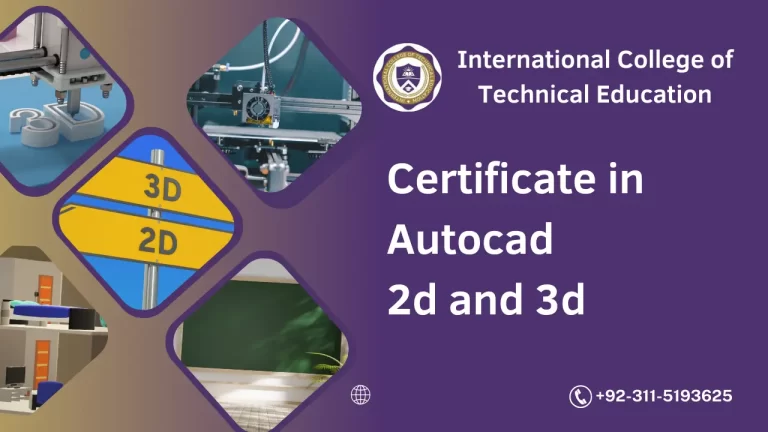In the fast-evolving field of electrical engineering, AutoCAD Electrical has become an essential tool for designing, drafting, and automating electrical systems. Whether you’re a student, professional, or enthusiast, mastering AutoCAD Electrical can open doors to exciting career opportunities. If you’re based in Chakwal or nearby regions, the AutoCAD Electrical course in Chakwal is an excellent way to acquire the skills needed for designing electrical systems with precision and efficiency.
The AutoCAD Electrical course in Chakwal is designed to provide a comprehensive understanding of AutoCAD Electrical, an industry-specific software developed by Autodesk to aid electrical engineers in creating detailed electrical systems designs. The software is tailored to automate electrical drafting tasks, which improves efficiency, reduces errors, and enhances productivity.
This course covers the basics of AutoCAD Electrical, focusing on electrical design tools, schematic drawings, panel layouts, and wiring diagrams. By the end of this course, students will have a solid foundation in AutoCAD Electrical and be equipped to handle real-world electrical engineering projects.
Course Overview
The AutoCAD Electrical course in Chakwal offers a practical, hands-on approach to learning AutoCAD Electrical. The course includes both theoretical lessons and practical exercises designed to give students a complete understanding of electrical drawing techniques. Students will be introduced to AutoCAD Electrical’s core features, including symbol libraries, schematic creation, electrical panel layouts, and documentation, and will learn how to create professional-quality electrical drawings.
The course is ideal for individuals looking to specialize in electrical design and drafting, as well as professionals who want to expand their skill set in electrical system design using AutoCAD.
Study Units
The AutoCAD Electrical course in Chakwal is divided into several modules, each covering a critical aspect of electrical design using AutoCAD. Here are the key study units:
1. Introduction to AutoCAD Electrical
- Overview of AutoCAD Electrical interface and workspace.
- Introduction to electrical design principles and standards.
- Customizing the workspace for electrical projects.
- Working with the AutoCAD Electrical toolset and libraries.
2. Electrical Drawing Fundamentals
- Understanding electrical symbols and schematics.
- Creating basic electrical drawings and circuits.
- Introduction to electrical panels and wiring diagrams.
- Using the “wire” and “symbol” commands to create electrical designs.
3. Creating Schematic Diagrams
- Creating single-line and multi-line electrical schematic diagrams.
- Working with electrical components, such as switches, breakers, and relays.
- Annotating electrical drawings and adding necessary labels.
- Linking electrical components for automated updates.
4. Panel Layout Design
- Designing electrical panel layouts and wiring.
- Organizing panel components for easy installation.
- Creating and modifying electrical symbols in the panel.
- Generating and documenting electrical panel designs.
5. Automating Electrical Designs
- Using AutoCAD Electrical’s automation features to streamline design work.
- Generating reports and bill of materials (BOM) for electrical designs.
- Creating symbol libraries and using pre-built electrical templates.
- Performing circuit analysis and error checks within the software.
6. Generating Wiring Diagrams
- Designing detailed wiring diagrams for electrical systems.
- Creating and managing power and control wiring diagrams.
- Using dynamic block attributes to automate wire numbering.
- Printing and plotting wiring diagrams for construction and installation.
7. Project Management and Documentation
- Managing large electrical design projects with AutoCAD Electrical.
- Organizing drawings, layers, and references for multi-page projects.
- Documenting electrical designs with AutoCAD Electrical’s standard templates.
- Creating project-specific reports and construction drawings.
8. Final Project: Electrical System Design
- Completing a real-world electrical design project.
- Designing a complete electrical system, including panel layout, schematic, and wiring diagrams.
- Applying AutoCAD Electrical’s tools to develop a professional electrical design ready for use in construction.
Learning Outcomes
By the end of the AutoCAD Electrical course in Chakwal, students will:
- Master AutoCAD Electrical Interface: Navigate the AutoCAD Electrical workspace with ease and proficiency.
- Create Detailed Electrical Schematics: Produce single-line, multi-line, and schematic drawings for electrical systems, using industry-standard electrical symbols.
- Design Electrical Panels and Wiring Diagrams: Develop professional electrical panel layouts, wiring diagrams, and detailed installation drawings.
- Utilize Automation Features: Leverage AutoCAD Electrical’s automation tools to streamline the design process, reduce errors, and enhance productivity.
- Generate Documentation and Reports: Create accurate project documentation, including wiring diagrams, reports, and bill of materials (BOM) for electrical systems.
- Manage Complex Electrical Projects: Organize and manage large-scale electrical design projects, from initial concept through to final design and documentation.
Course Benefits
The AutoCAD Electrical course in Chakwal offers a number of valuable benefits:
- Industry-Relevant Skills: Gain proficiency in AutoCAD Electrical, a leading software used by electrical engineers and designers worldwide.
- Increased Productivity: By learning AutoCAD Electrical’s automation tools, students can design electrical systems faster and more accurately.
- Comprehensive Learning: The course covers everything from schematic drawings to panel layout design, offering a holistic view of electrical system design.
- Hands-On Practice: Students will work on real-world projects and case studies to reinforce their learning and build a practical skill set.
- Improved Career Opportunities: Mastering AutoCAD Electrical opens up career opportunities in electrical design, electrical engineering, and construction.
- Global Recognition: AutoCAD Electrical is an industry-standard software, and gaining expertise in this tool can make you more competitive in the global job market.
- Professional Growth: The course helps both beginners and experienced professionals improve their electrical design skills, giving them an edge in the workplace.
Who Is This Course For?
The AutoCAD Electrical course in Chakwal is ideal for:
- Aspiring Electrical Engineers: Students looking to gain practical skills in electrical design and drafting.
- Electrical Designers and Drafters: Professionals who want to expand their skill set and improve efficiency in designing electrical systems.
- Mechanical Engineers: Engineers working on interdisciplinary projects that require integration with electrical systems.
- Freelancers: Individuals interested in offering electrical design services as freelancers.
- Students in Related Fields: Students studying electrical, electronics, or mechanical engineering who want to learn AutoCAD Electrical for their coursework or future careers.
Future Progression for This Course
After completing the AutoCAD Electrical course in Chakwal, students can pursue several pathways for further career growth:
- Advanced AutoCAD Certifications: Students can earn certifications in AutoCAD Electrical or AutoCAD Design, further enhancing their professional credentials.
- Specialized Electrical Design Tools: Students can expand their knowledge by learning other specialized electrical design software, such as ETAP, Revit MEP, or PowerCAD.
- Project Management Roles: With AutoCAD Electrical expertise, students can pursue careers in electrical project management, overseeing the design and implementation of electrical systems.
- Freelance and Consulting Careers: Graduates can offer electrical design services to clients in various industries, working as independent consultants or contractors.
- Higher Education: Students can pursue advanced degrees in electrical engineering, building on their AutoCAD Electrical skills and knowledge.
- Job Opportunities: Graduates can seek employment as electrical design engineers, CAD technicians, or electrical project engineers in construction firms, electrical consultancies, and manufacturing companies.
Conclusion
The AutoCAD Electrical course in Chakwal is a must-take for anyone looking to specialize in electrical system design and drafting. Whether you’re a student, a professional, or someone looking to transition into the field of electrical engineering, this course will provide you with the essential skills to create accurate, detailed, and efficient electrical designs using AutoCAD Electrical.
By mastering this software, you will enhance your career prospects, improve your productivity, and set yourself apart in the competitive field of electrical design. Enroll today and take the first step towards becoming a highly skilled electrical designer with AutoCAD Electrical!







